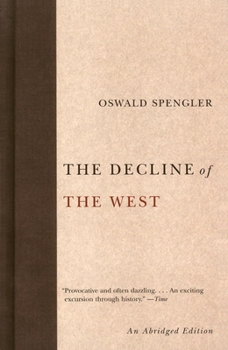Book Overview
Since its first publication more than eighty years ago, The Decline of the West has ranked as one of the most widely read and talked about books of our time. A sweeping account of Western culture by a historian of legendary intellect, it is an astonishingly informed, forcefully eloquent, thrillingly controversial work that advances a world view based on the cyclical rise and fall of civilizations. This abridgment presents the most significant of Oswald Spengler's arguments, linked by illuminating explanatory passages. It makes available in one volume a masterpiece of grand-scale history and far-reaching prophesy that remains essential reading for anyone interested in the factors that determine the course of civilizations.
Format:Paperback
Language:English
ISBN:1400097002
ISBN13:9781400097005
Release Date:April 2006
Publisher:Vintage
Length:480 Pages
Weight:1.09 lbs.
Dimensions:1.2" x 5.2" x 7.9"
Customer Reviews
3 ratings
Fascinating and thought-provoking
Published by Thriftbooks.com User , 19 years ago
The Decline of the West is the magnum opus of Oswald Spengler (1880-1936), a German historian and philosopher. In it, Spengler rejects the idea that the future of the West (or indeed of any culture) is an open-ended advance from the primitive past to an ever more glorious and expansive future. Instead, cultures (including the West) experience an almost organic history of Spring, Summer, Autumn and Winter. According to Spengler, the West moved out of its Summer period with the dawn of the nineteenth century, and into a Civilization phase. This phase is dominated by mega-cities, and money and atheism come into ascendance. And what lies in the future? Caesarism, and a long period of stagnation in the arts and sciences. Now, the above summary is inevitably bound to be overly simplistic, even to the point of being misleading. The Decline of the West was originally published as two books, and it is a deep and erudite philosophical look at the history of the world, so any small summary is bound to be insufficient to do it justice. Having heard this work referenced so many times, I decided to read it for myself. In fact, though it does present a deterministic view of history, it does not propose a West that is about to collapse and be swept into the dustbin of history (as some people want it to). In fact, this is a cogent, penetrating look at history, which certainly seems to accurately predict how the West has developed from the first book's initial publication in 1918. Now, I must admit that like many scholarly books of the era, this one has a dense, thickly argued text that makes for some very heavy reading indeed. But, if you are willing to devote time to the reading of this book, and more time to digest what it has to say, you will be rewarded with one of the fascinating and thought-provoking look at the modern West. Are we at the End of History, or the end of the West? Read this book and find out.
Must have
Published by Thriftbooks.com User , 20 years ago
This book is a must have for ww2 fans who like a book with a combo of fast paced action and historical authenticity, that keeps you on the edge of your seat until the very end.
Hypnotic Prose (Written on the Wall?)
Published by Thriftbooks.com User , 24 years ago
Oswald Spengler was a schoolteacher of immense intellect. The book is filled with observations and insights into virtually every known civilization in the sweep of human history. The study and reflection behind the work no doubt contributed to the magisterial tone, confident in the self-evident truths that it conveys. Spengler codifies the progress and decline of civilizations in search of archtypes and characteristic forms of expression. His classification of civilizational forms, i.e., Magian, Faustian, etc., then is used to show how cultures within each type, at differing stages of development, react to and upon each other. His discussion of Magian civilization is perhaps the most compelling. He traces its origin to Zoroaster and the apoclyptic Hebrew prophets of the early First Millenium, B.C. The concepts common to all forms of Magian life are discussed: the architectural expression of worship as a "world-cave," seen in the use of the dome and the contrast of light and shadow, illustrate the vivifying force of the battle between Dark and Light, and the coming firey end of the world. This discussion is all the more compelling with the rise of militant Islam, dormant and in retreat before secular modernism when Spengler wrote. Prophetic statements are rarer than prophetic insights, in that Spengler makes few outright predictions, instead giving trend analysis. The reader may keep turning pages, looking in vain for the elusive prediction of our future, the feeling of which mounts with each vingette illustrating the Law of Civilization and Decay (to borrow Charles Adams' title). Of the few that he finds, one is that, as the first millenium of the Christian era belonged to Peterine cultire ("Faustian" civilization rising) and the second to Pauline/Protestant civilization, the next millenium would bring a flourishing of Johnnine faith, in the Eastern mode. While Adams and Adam Ferguson said much of this before, this is the better work. If Spengler is right, capital replaces faith, and Caesar follows capital. If the Age of Capital is closing, will the dominant type of the Western future be Caesar?-Lloyd A. Conway





